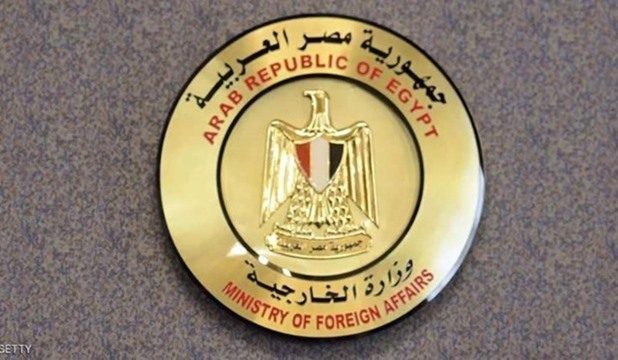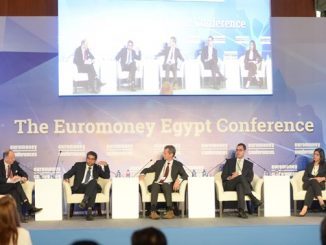
Egypt has blamed Ethiopia for the failure of the latest round of talks on the construction of a controversial Nile dam, a critical issue for Cairo as it seeks to protect its main source of freshwater for its large and growing population.
Yesterday, Egyptian Ministry of Foreign Affairs (MFA) issued a press release, slamming Ethiopia over its latest comments concerning the final stage of the negotiations of the controversial Grand Ethiopian Renaissance Dam (GERD) in Addis Ababa.
The Egyptian MFA press release criticized the Ethiopian side, saying that the Ethiopian Ministry of Foreign Affairs’ statement on GERD negotiations includes some “misleading and unacceptable information” on Egypt’s negotiations during the meeting, which was attended by representatives from the United States and the World Bank.
Ethiopia’s statement “deliberately involved misleading and distorting facts, and presented a picture totally inconsistent with the course of the negotiations and against Egypt’s stances and its technical proposals,” the Egyptian MFA said, noting that the statement runs counter to the realities of the series of three previous meetings that were held in light of the outcomes of Washington-held meeting on November 6, 2019.
Egypt also denied the ‘claims’ made by Ethiopian side, saying that Egypt did not ask for filling the $4-billion dam’s reservoir over the span of 12-21 years.
“Contrary to what was stated by the Ethiopian Foreign Ministry which claimed that Egypt requested to fill the Renaissance Dam in a period of 12 to 21 years, Egypt did not specify a number of years to fill Dam, but the three countries agreed more than a year ago on filling the dam in stages depending on the water inflow of the Blue Nile. The Egyptian proposal leads to filling the Renaissance Dam in 6 or 7 years if the river’s inflow is at the average or above average during the period of filling the dam. However, during the period of drought, the Egyptian proposal enables the Renaissance Dam to generate 80% of its electricity production, which means that the Ethiopian side will bear the minimum burden of drought,” Egypt said in Friday’s statement.
Egypt also said that the four meetings failed to reach a deal due to Ethiopia’s intransigence, accusing Addis Ababa of imposing the policy of fait accompli and controlling over the Blue Nile with putting into consideration the water interests of the downstream countries [Egypt and Sudan].
Egypt said that Ethiopia violates its legal obligations in accordance with international treaties and norms, “foremost among which is the Declaration of Principles Agreement concluded on March 23, 2015, as well as the 1902 agreement that Ethiopia concluded with its free will as an independent state, and the 1993 agreement in which it pledged not to cause harm to Egypt’s water interests,” adding “Ethiopia is seeking to control the Blue Nile as it does in other common international rivers, in which it shares with other nations.”
“Egypt expresses its surprise that whenever it asks for agreeing on effective steps to deal with the years of drought that may occur during the filling, Ethiopia is threatens to unilaterally fill the Renaissance Dam, the matter that Egypt rejected throughout the negotiations as it constitutes an explicit violation of the 2015 Declaration of Principles Agreement and the Ethiopian obligations under the rules of international law,” the statement read.
Egypt deplored the Ethiopian Foreign Ministry’s comments which “do not help create an appropriate environment for tangible achievements in the negotiations.” Cairo affirmed its participation in the upcoming meeting for the foreign and water ministers of the three countries in the US Department of Treasury on January 13, 2020, in light of the outcomes of the Washington meeting that was held on November 6, 2019, the statement said.
At the end of the final round of a four-meeting series between Egypt, Sudan, and Ethiopia in Addis Ababa on Thursday, Egypt and Ethiopia announced that the two-day discussions reached a deadlock again.
The construction of the $4.6 billion Grand Ethiopian Renaissance Dam on the Blue Nile, which is around 70% complete and promises to provide much-needed electricity to Ethiopia’s 100 million people, has been a contentious point among Ethiopia, Sudan and Egypt, the three main Nile Basin countries.
The Blue Nile flows from Ethiopia into Sudan where it joins the White Nile near the capital, Khartoum, to form the Nile River. Eighty-five percent of Nile waters originate in Ethiopia from the Blue Nile, which is one of the Nile’s two main tributaries.
Egypt’s Irrigation Ministry, in a statement released late on Thursday, said that despite its delegation’s attempts to “narrow differences” among the three countries, the Ethiopian government failed to prove that it would take all necessary precautions to ensure that its dam will not affect Egypt’s water supply, especially in times of drought.
Earlier, Ethiopian Minister for Water and Energy Sileshi Bekele told reporters that the Egyptian delegation “was in no spirit of reaching an agreement” during this last round of talks. He added that his government would not accept an Egyptian suggestion to extend the time to fill up the dam from 12 to 21 years. He said Ethiopia would start filling the dam in July 2020, at the start of its rainy season.
Months of meetings have so far failed to yield consensus, including on a timetable for filling the reservoir. Egypt fears the project, set to be Africa’s largest hydraulic dam, could reduce its share of the Nile, a lifeline for Egypt’s 100 million people.
Ministers from the three countries are now expected to meet in Washington D.C. on Monday to report on the progress they made so far. The United States and The World Bank observers are expected to attend the talks.
Last year, Egypt’s Abdel Fattah Al-Sisi had pleaded to the United States and the international community to mediate a solution to the ongoing Nile dispute. Foreign ministers of the three Nile Basin countries had met in Washington D.C. in November and agreed to resolve the matter by mid-January.
Following is the full text of the Egyptian Ministry of Foreign Affairs’ statement posted on its official Facebook account:
Press Release
The Arab Republic of Egypt affirms that the statement issued by the Ethiopian Ministry of Foreign Affairs regarding the ministerial meeting on the Grand Ethiopian Renaissance Dam (GERD), which was held on January 8-9, 2020 in Addis Ababa, has included many outright rejected fallacies, it also contained deliberate misinformation and distortion of facts, and provided an image that absolutely contradicts the course of the negotiations and Egypt’s positions and technical proposals as well as the actual deliberations during this meeting and in the three precedent ministerial meetings which were held over the past two months to discuss the rules for the GERD filling and operationalization.
Egypt indicates that these four ministerial meetings did not lead to tangible progress due to Ethiopia’s intransigence and its adoption of excessive positions that reveals its intention to impose a fait accompli and to extend its control over the Blue Nile in order to proceed towards the filling and operationalization of the Renaissance Dam without the slightest consideration of the water interests of the downstream countries, Egypt in particular being the last downstream country, in contravention of Ethiopia’s legal obligations under international treaties and norms, primarily the Declaration of Principles Agreement concluded on March 23, 2015, as well as the 1902 Agreement that Ethiopia concluded of its own free will as an independent state, and the 1993 Agreement in which it pledged not to harm Egypt’s water interests; nevertheless, Ethiopia is seeking to control the Blue Nile, just as it does in other international rivers shared with sisterly countries.
Egypt affirms that this unfortunate Ethiopian approach was evident in the technical stances and proposals that it presented during the ministerial meetings, and which reflects Ethiopia’s intention to fill the Dam’s reservoir without restrictions or applying any rules that provides genuine guarantees for the downstream countries and protects them from potential damage due to the filling process.
Moreover, Egypt clarifies that the reason for Ethiopia’s refusal to drain the natural discharge during the operationalization of the GERD is due to its intention to use this Dam, which only aims to generate electricity, to launch future projects and freely exploit the resources of the Blue Nile without paying attention to Egypt’s water interests and rights, guaranteed by international law.
Egypt engaged in these negotiations in good faith and in a positive spirit that reflects its sincere desire to reach a just and balanced agreement in the common interests of Egypt and Ethiopia. This was reflected in the flexible and open ideas and technical models presented by Egypt during the meetings. Contrary to what the Ethiopian Foreign Ministry statement claimed, that Egypt requested to fill the Renaissance Dam in a period of 12 to 21 years, Egypt did not specify a number of years for the filling of the Dam, in fact the three countries have agreed more than a year ago on filling the GERD in stages which the speed of their implementation depends on the Blue Nile annual discharge, the Egyptian proposal leads to filling the GERD in 6 or 7 years if the River’s discharge is average or above average during the filling period, in the event of a drought, the Egyptian proposal enables the GERD to generate 80% of its electricity production capacity, this means that the Ethiopian side will bear minimal burden in the case of a drought.
Contrary to the misconceptions in the Ethiopian Foreign Ministry statement regarding the definition of water deficit, Egypt proposed mechanisms and rules to adapt to the hydrological changes in the Blue Nile and to deal with drought years that may coincide with the GERD filling process, this includes slowing down the filling speed and using quantities of water stored in the Dam to limit the negative effects of the filling process during drought, and bridge the water deficit that the downstream countries may be exposed to, while preserving the GERD’s capacity of generating electricity at accelerated rates; however, Ethiopia insists that Egypt bears alone the burden of drought; this contradicts the rules of international law and the principles of justice and fairness related to international rivers.
Furthermore, Egypt expresses its astonishment that whenever it calls for the necessity of agreeing on effective steps to deal with any drought that may occur during the filling, Ethiopia declares its readiness to unilaterally fill the Renaissance Dam, this has been rejected by Egypt throughout the negotiations as it constitutes an explicit violation of the 2015 Declaration of Principles Agreement and Ethiopia’s obligations under the rules of international law.
Egypt also denounces the allegations made in the Ethiopian Foreign Ministry statement claiming that Egypt seeks to monopolize the Nile waters; and points out that such empty statements and slogans – which may be issued for domestic use – does not help creating a favorable environment to achieve progress in negotiations.
Egypt will participate in the meeting convened by the US Secretary of Treasury with the Foreign and Water Ministers of Egypt, Sudan and Ethiopia in Washington on January 13 and 14, 2020, out of its commitment to working honestly in order to reach a fair and balanced agreement, and in the context of its efforts to preserve the unwavering interests of the Egyptian people.



